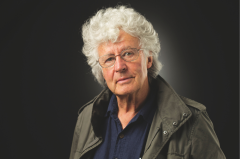Explore how constant phone use shapes your mind and learn how a digital detox can restore focus, calm and meaning.
You reach it for it before you’ve even opened the unlock screen, before your brain registers the day. It follows you everywhere, like a parasite, and losing or forgetting it feels like life is going to end. More often than not, you fi nd yourself scrolling and “checking” on auto-pilot and in a daze, just in case you’ve missed something.
The pull of the glowing screen is so strong and so baked into our days that it feels impossible to resist. It has seeped into every corner of life — from making phone calls to verifying identity to paying for fuel and groceries. There’s the compulsion to document every morsel, every cracked footpath, every sunset, even though the photos never match the moment. We tell ourselves we’re staying informed and connected … but are we really?
Somewhere between the news alert, the work email and the half-hour lost in an endless loop of reels, something else entirely is happening. We’re searching but not quite sure for what. Smartphones promise connection and inspiration but rarely deliver the kind we truly crave. A notification sparks for a second, then fades, leaving behind an insatiable hunger.
Deep down we know the hold our phones have over us, but so many feel powerless to change this dynamic. How do we go back to “how things were”? For most of human history, the hunger for warmth, creativity and meaning was satisfied in other ways — in the company of friends, in ritual and community, in the leisurely work of making or in time spent with the natural world.
Today, we try to feed our souls through our devices, skimming life as if it were a feed: quickly, distractedly, half-awake. And still, we are left empty.
Fragments of presence
Most spiritual traditions teach that what you give your attention to shapes who you become. As Johann Hari writes in Stolen Focus, “The truth is that you are living in a system that is pouring acid on your attention every day.” The attention economy thrives on engineered distraction. Social media apps and platforms are intentionally designed to hijack your focus, using algorithms that reward your engagement with binges of dopamine (your brain’s chemical messenger for motivation and reward anticipation).
When your attention is shattered into microbursts of checking, swiping and scrolling, you start to mistake stimulation for meaning. Add to this a culture that rewards multitasking and blurs the lines between work and rest, and you end up wired but unsatisfied. The more untethered and fragmented you feel, the more you reach for the device again, trying to plug a hole.
The unspoken agreement on modern life’s soul-stripping rules only further disconnects us. We’ve traded the slow weaving of relationships for quick bursts of text. We’ve stopped calling, preferring one-sided voice notes to avoid discomfort in real time. We’ve replaced the open, unstructured hours where creativity and intimacy once thrived with endless interruptions of alerts. In the process, depth has given way to convenience, and presence has been fractured into pixels. What was once nurtured in conversation and shared experience is now flattened into notifications, emojis and half-glimpsed stories that vanish in a day.
We may not name it out loud, but most of us feel the ache. The noise that we fill our lives with has crowded out our capacity for stillness, imagination and wonder. Attention is more than focus — it is the foundation of how we experience love, purpose and creativity.
To give attention is to give yourself, which is why its constant erosion feels like a spiritual wound. We do not belong to our devices. To reclaim attention is therefore an act of devotion, a way of choosing what and whom we honour with our presence.
Neuroscience of breaks
Science is now catching up with what poets, monks and mystics have always known. Stepping back from constant stimulation changes how your mind functions and how you feel. In one study, young adults were asked to give up their smartphones for 72 hours. Before and after the break, the participants lay in an fMRI scanner while researchers showed them smartphone-related images. The scans lit up something fascinating: brain regions tied to craving, reward and focus (the nucleus accumbens and anterior cingulate cortex) showed measurable changes after just three days. These areas are rich in dopamine and serotonin receptors, the same chemical systems that regulate motivation, habit loops, mood and impulse control.
Dopamine is the brain’s “wanting” signal. It’s trained to fire in anticipation of a reward. In the context of your device, every ping and swipe is a micro-hit of dopamine that keeps you coming back. Over time, the receptors become less sensitive, and it can take more stimulation to feel the same spark. That’s why you may find yourself checking more often or scrolling longer without feeling satisfied.
Serotonin works more slowly and helps to regulate mood, impulse control and a deeper sense of satisfaction. When dopamine pathways are constantly firing, they start to overshadow serotonin. This can leave you feeling restless, anxious and less able to access deeper contentment.
In short: the brain recalibrates to expect quick bursts of stimulation, while losing touch with slower, richer forms of reward. A break gives these systems space to reset. Dopamine receptors become more sensitive again, and serotonin has the chance to restore balance, making everyday pleasures such as a conversation, meal and time outdoors feel nourishing instead of flat.
The study also revealed something unexpected. Participants didn’t feel radically different. Their mood scores and self-reported cravings barely budged. They were reacting less automatically to cues, as if the “habit loop” was loosening even before they consciously realised it.
Longer breaks show even more striking effects. In a two-week study where participants blocked mobile internet access (but could still make calls), 91 per cent reported improvement in at least one area — mental health, sharper focus or better sleep. Cognitive tests suggested their focus had shar





